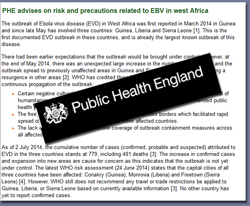Public Health England (PHE) has urged British doctors to be on alert for signs of the world's deadliest disease - the Ebola virus.
Currently taking lives in West Africa, there are fears it could travel to the UK.
The latest outbreak is not only the worst in history, judging by the number of deaths, it is also the first to have spread beyond remote West African jungle villages into sprawling urban centres and national capitals.
Symptoms start two days to three weeks after contracting the virus with a fever, throat and muscle pains, and headaches. There is then nausea, vomiting and diarrhea along with decreased functioning of the liver and kidneys. At this point some people begin to have problems with bleeding.
Exposure to the virus can be the result of contact with bodily fluids of infected persons or animals such as a monkey or fruit bats.
The notice to all UK clinicians from PHE reads:
The outbreak of Ebola virus disease (EVD) in West Africa was first reported in March of this year in Guinea and since late May has involved three countries: Guinea, Liberia and Sierra Leone [1]. This is the first documented EVD outbreak in these countries, and is already the largest known outbreak of this disease.
 There had been earlier expectations that the outbreak would be brought under control. However, at the end of May 2014, there was an unexpected large increase in the number of new cases, and the outbreak spread to previously unaffected areas in Guinea and Sierra Leone as well as showing a resurgence in other areas.
There had been earlier expectations that the outbreak would be brought under control. However, at the end of May 2014, there was an unexpected large increase in the number of new cases, and the outbreak spread to previously unaffected areas in Guinea and Sierra Leone as well as showing a resurgence in other areas.
The World Health Organisation (WHO) has credited three factors as being responsible for the continuous propagation of the outbreak:
- Certain negative cultural practices and traditional beliefs, which have resulted in mistrust of humanitarian aid workers, and apprehension and resistance to adopt recommended public health preventive measures.
- The free and frequent movement of people within and across borders which facilitated rapid spread of the infection across and within the three affected countries.
- The lack of comprehensive and effective coverage of outbreak containment measures across all affected regions.
As of 2 July 2014, the cumulative number of cases (confirmed, probable and suspected) attributed to EVD in the three countries stands at 779, including 481 deaths
The increase in confirmed cases and expansion into new areas are cause for concern as this indicates that the outbreak is not yet under control. The latest WHO risk assessment (24 June 2014) states that the capital cities of all three countries have been affected: Conakry (Guinea), Monrovia (Liberia) and Freetown (Sierra Leone). However, WHO still does not recommend any travel or trade restrictions be applied to Guinea, Liberia, or Sierra Leone based on currently available information. No other country has yet to report confirmed cases.
Increasing case numbers and extended geographical spread may increase the risk for UK citizens engaged in humanitarian aid and healthcare delivery. This is because most human infections result from direct contact with the bodily fluids or secretions of infected patients, particularly in hospitals (nosocomial transmission) and as a result of unsafe procedures, use of contaminated medical devices (including needles and syringes) and unprotected exposure to contaminated bodily fluids. Interim guidance for humanitarian aid workers in affected countries outlining recommended precautions and advice on what to do if infection is suspected has been produced.
The risk for tourists, visitors or expatriate residents in affected areas, is still considered very low if elementary precautions are followed.
It remains unlikely, but not impossible, that travellers infected in Guinea or Liberia could arrive in the UK while incubating the disease and develop symptoms after their return. Anyone returning from affected areas who has a sudden onset of symptoms such as fever, headache, sore throat and general malaise within three weeks of their return should seek rapid medical attention and mention their recent travel. Clinicians and other medical staff have been alerted via the Central Alerting System about the ongoing situation in West Africa and informed of the available guidance and assistance for diagnosing and managing cases.
In the event of a symptomatic person with a relevant travel history presenting to health care, the PHE Imported Fever Service (0844 7788990) should be contacted by infectious disease clinicians or microbiologists in order to discuss testing.
Further information regarding EVD and this particular outbreak is available on the Ebola pages of the HPA legacy website.
Source: PHE / Unionsafety
See also: What is Ebola Virus Disease


 There had been earlier expectations that the outbreak would be brought under control. However, at the end of May 2014, there was an unexpected large increase in the number of new cases, and the outbreak spread to previously unaffected areas in Guinea and Sierra Leone as well as showing a resurgence in other areas.
There had been earlier expectations that the outbreak would be brought under control. However, at the end of May 2014, there was an unexpected large increase in the number of new cases, and the outbreak spread to previously unaffected areas in Guinea and Sierra Leone as well as showing a resurgence in other areas.